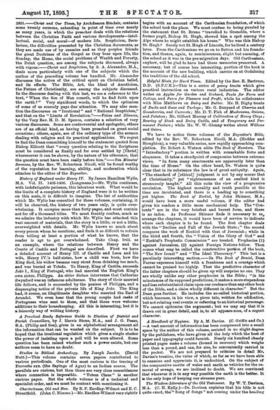We have to notice three volumes of the Expositor's Bible,
edited by the Rev. W. Robertson Nicoll, M.A. (Hodder and Stoughton), a very valuable series, now rapidly approaching com- pletion. Dr. Robert A. Watson edits The Book of Numbers. The " Introductory " portion is written with remarkable force and eloquence. It takes a standpoint of compromise between extreme views. " In form many enactments are apparently later than the time of Moses." On the other hand, Dr. Watson is quit• clear that in its substance the law is of great antiquity. Again, "The standard of [ethical] judgment is not by any means that of Christianity," yet "righteousness. of an exalted kind is strenuously taught." All this suits the view of a progressive revelation. The highest morality and truth possible at the time are inculcated, and there is a leading up to something yet higher. The Book of Ezekiel, by John Skinner, M.A., would have been a more useful volume, if the editor had given his readers a little more mechanical help. The "Con- tents " are in the very briefest and barest form, and there is no index. As Professor Skinner finds it necessary to re, arrange the chapters, it would have been of service to indicate where each chapter is to be found. The first chapter deals with the " Decline and Fall of the Jewish State ; " the second compares the work of Ezekiel with that of Jeremiah ; while in the third and fourth, the " Vision of the Glory of God" and " Ezekiers Prophetic Commission" are treated. Prophecies (1) against Jerusalem, (2) against Foreign Nations follow. Then comes what may be called the constructive portion of the book, "The New Israel" and "The Ideal Theocracy." This last is a peculiarly interesting section.—In The Book of Daniel, Dean Farrar expresses himself with a frankness and a courdge which cannot be praised too highly. That the predictive character of the latter chapters should be given up will surprise no one. They are wholly unlike any other prophecies in the Bible ; "in the minuteness of its supposed predictions, it makes a more stupendous and less substantiated claim upon our credence than any other book of the Bible, and a claim wholly different in character." But the Dean goes further. He includes the so-called historical portion, which becomes, in his view, a pious tale, written for edification, but not relating real events or referring to an historical personage. We cannot epitomise the argument ; but we may say that it is drawn out in great detail, and is, to all appearances, of a cogent character.


































 Previous page
Previous page